2012版自考英语二课文中英文对照
2012年自考英语二Unit2
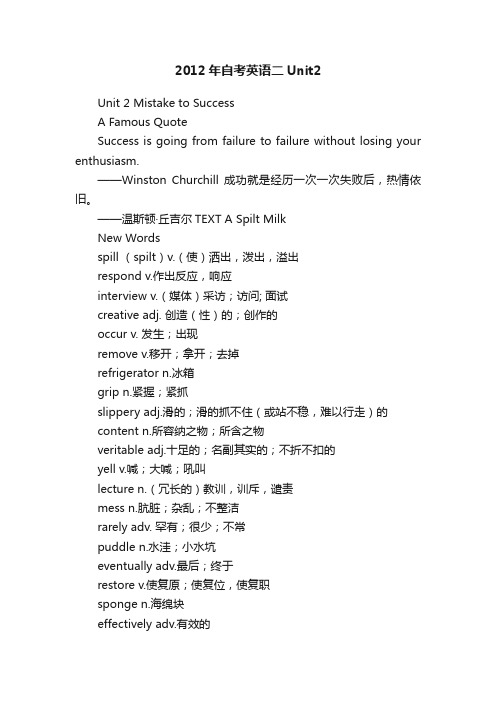
2012年自考英语二Unit2Unit 2 Mistake to SuccessA Famous QuoteSuccess is going from failure to failure without losing your enthusiasm.——Winston Churchill 成功就是经历一次一次失败后,热情依旧。
——温斯顿·丘吉尔TEXT A Spilt MilkNew Wordsspill (spilt)v.(使)洒出,泼出,溢出respond v.作出反应,响应interview v.(媒体)采访;访问; 面试creative adj. 创造(性)的;创作的occur v. 发生;出现remove v.移开;拿开;去掉refrigerator n.冰箱grip n.紧握;紧抓slippery adj.滑的;滑的抓不住(或站不稳,难以行走)的content n.所容纳之物;所含之物veritable adj.十足的;名副其实的;不折不扣的yell v.喊;大喊;吼叫lecture n.(冗长的)教训,训斥,谴责mess n.肮脏;杂乱;不整洁rarely adv. 罕有;很少;不常puddle n.水洼;小水坑eventually adv.最后;终于restore v.使复原;使复位,使复职sponge n.海绵块effectively adv.有效的tiny adj. 极小的;微小的discover v.查明;发现grasp v.抓紧;抓牢lip n.边,边沿renowned adj. 有名的;闻名的;受尊敬的remark v.谈论;评论opportunity n.机会;时机scientific adj.科学(上)的;关于科学的valuable adj. 很有用的;很重要的;宝贵的Phrases and Expressionsin this manner 用这种方式set …apart from区别;使与众不同重点词汇讲解spill v.(使)洒出,泼出,溢出eg: The ink spilt all over the desk. 墨水洒了一桌子。
(2012年版)自考英语二24篇课文单词、短语汇总

Unit 1 The Power of Language1A Critical Reading New words1. critical adj. 有判断力的;判断公正(或审慎)的2. non-fiction n. 纪实文学3. position n. 观点;态度;立场4. statement n. 说明;说法;表态5.question v. 表示疑问;怀疑out of question / out of the question6. evaluate v. 估计;评价;评估7. context n. 事情发生的背景,环境,来龙去脉8.value n. values [pl.]是非标准;价值观valuableinvaluable=pricelessvalueless9. represent v. 描述;表现representative adj./n.10. assertion n. 明确肯定;断言11. sufficient adj. 足够的;充足的sufficiencyinsufficient12. statistic n. statistics [pl.]统计数字;统计资料13. integrate v.(使)合并,成为一体14. authority n.专家;学术权威;泰斗an/the authority on sth.authorize15. compare v. 比较;对比compare A with Bcompare A to B16. subject n. 主题;题目;题材17. consistent adj. 相符的;符合的18. inconsistency n. 不一致19. assumption n. 假定;假设20. case n. 具体情况;事例in casein case of firein case that…a case in pointconfirmed/suspected cases21. directly adv. 直接地;径直地22. identify v. 找到;发现23. valid adj. 符合逻辑的;合理的;确凿的validity n. 有效性,正确(性)invalid24. credible adj. 可信的;可靠的incredible=unbelievable25. landmark n.(标志重要阶段的)里程碑26. relevant adj. 紧密相关的;切题的relevancy n. 关联;恰当irrelevant27. current adj. 现时发生的;当前的28. appropriate adj. 合适的;恰当的inappropriateIt's (not) appropriate that ….29. bias n. 偏见;偏心;偏向30. considerably adv. 非常;很;相当多地considerconsideringconsiderableconsiderateconsideration31. Democrat n. (美国)民主党党员,民主党支持者民32. Republican n. (美国)共和党党员,共和党支持者33. reflect v. 显示;表明;表达34. informed adj. 有学问的;有见识的well-informedill-informedPhrases and Expressions1. apply to 使用;应用2. put forth 提出;产生3. take …into account 考虑到;顾及4. accept/take …at face value 相信表面;信以为真5. with a grain of salt 有保留地;持怀疑态度地1B II. Text LearningThe Language of ConfidenceNew words1. confidence n.自信心;把握相关词:confidentbe confident of sb. / sth.have / lose confidence in sb. / sth.注意比较:confident / confidential2. program v. 训练;培养3. mastery n. 控制;驾驭4. destiny n. 命运;天命;天数5. dramatically adv. 巨大地;惊人地;显著地6. quality n. 质量;品质7. subconscious adj. 下意识的;潛意识的8. please v. 使满意;使愉快9. command n.(给人或动物的)命令10. knowingly adv. 故意地;蓄意地11. impact n. 巨大影响;强大作用12. matter v. 事关紧要;有重大影响13. confident adj. 自信的;有自信心的14. sense n.(对重大事情的)感觉,意识15. eliminate v. 排除;清除;消除eliminate all grammatical mistakesbe eliminated in the first round16. disempower v. 剥夺;使失去权利;剥夺力量注意构词法:dis(表示否定)+em(使,赋予)+poweren- / em-常见的动词前缀,如:enable, enrich, endanger, enlarge等。
自考英语(二)教材课文翻译
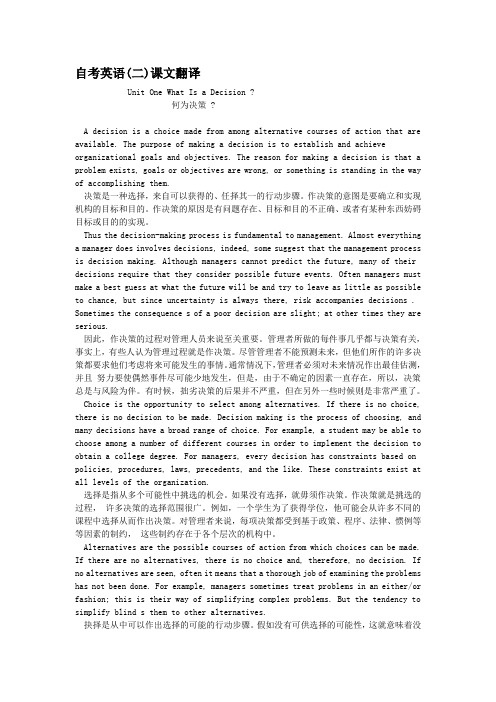
自考英语(二)课文翻译Unit One What Is a Decision ?何为决策 ?A decision is a choice made from among alternative courses of action that are available. The purpose of making a decision is to establish and achieve organizational goals and objectives. The reason for making a decision is that a problem exists, goals or objectives are wrong, or something is standing in the way of accomplishing them.决策是一种选择,来自可以获得的、任择其一的行动步骤。
作决策的意图是要确立和实现机构的目标和目的。
作决策的原因是有问题存在、目标和目的不正确、或者有某种东西妨碍目标或目的的实现。
Thus the decision-making process is fundamental to management. Almost everything a manager does involves decisions, indeed, some suggest that the management process is decision making. Although managers cannot predict the future, many of their decisions require that they consider possible future events. Often managers must make a best guess at what the future will be and try to leave as little as possible to chance, but since uncertainty is always there, risk accompanies decisions . Sometimes the consequence s of a poor decision are slight; at other times they are serious.因此,作决策的过程对管理人员来说至关重要。
2012版英语二自学教程课文
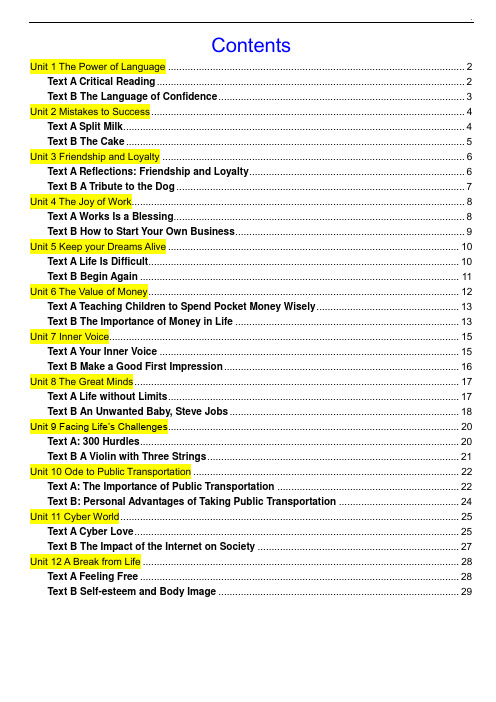
ContentsUnit 1 The Power of Language (2)Text A Critical Reading (2)Text B The Language of Confidence (3)Unit 2 Mistakes to Success (4)Text A Split Milk (4)Text B The Cake (5)Unit 3 Friendship and Loyalty (6)Text A Reflections: Friendship and Loyalty (6)Text B A Tribute to the Dog (7)Unit 4 The Joy of Work (8)Text A Works Is a Blessing (8)Text B How to Start Your Own Business (9)Unit 5 Keep your Dreams Alive (10)Text A Life Is Difficult (10)Text B Begin Again (11)Unit 6 The Value of Money (12)Text A Teaching Children to Spend Pocket Money Wisely (13)Text B The Importance of Money in Life (13)Unit 7 Inner Voice (15)Text A Your Inner Voice (15)Text B Make a Good First Impression (16)Unit 8 The Great Minds (17)Text A Life without Limits (17)Text B An Unwanted Baby, Steve Jobs (18)Unit 9 Facing Life’s Challenges (20)Text A: 300 Hurdles (20)Text B A Violin with Three Strings (21)Unit 10 Ode to Public Transportation (22)Text A: The Importance of Public Transportation (22)Text B: Personal Advantages of Taking Public Transportation (24)Unit 11 Cyber World (25)Text A Cyber Love (25)Text B The Impact of the Internet on Society (27)Unit 12 A Break from Life (28)Text A Feeling Free (28)Text B Self-esteem and Body Image (29)Unit 1 The Power of LanguageA Famous QuoteLanguage is the dress of thought.------Samuel JohnsonSamuel Johnson (1709-1784), British man of letters, one of the most outstanding figures of the 18th century in England. He made lasting contributions to English literature as a poet, essayist, moralist, literary cr itic, biographer, editor and lexicographer. Johnson has been described as “arguably the most distinguished man of letters in English history.”Text A Critical ReadingPre-reading Questions1. Do you usually challenge the idea an author represents? What do you think is active reading?2. What suggestions do you expect the author will give on reading critically?Critical reading applies to non-fiction writing in which the author puts forth a position or seeks to make a statement. Critical reading is active reading. It involves more than just understanding what an author is saying. Critical reading involves questioning and evaluating what the author is saying, and forming your own opinions about what the author is saying. Here are the things you should do to be a critical reader.Consider the context of what is written. You may be reading something that was written by an author from a different cultural context than yours. Or, you may be reading something written sometime ago in a different time context than yours. In either case, you must recognize and take into account any differences between your values and attitudes and those represented by the author.Question assertions made by the author. Don’t accept what is written at face value. Before accepting what is written, by certain that the author provides sufficient support for any assertions made. Look for facts, examples, and statistics that provide support. Also, look to see if the author has integrated the work of authorities.Compare what is written with other written work on the subject. Look to see that what is written is consistent with that others have written about the subject. If there are inconsistencies, carefully evaluate the support the author provides for the inconsistencies.Analyze assumptions made by the author.Assumptions are whatever the author must believe is true in order to make assertions. In many cases, the author’s assumptions are not directly stated. This means you must read carefully in order to identify any assumptions. Once you identify an assumption, you must decide whether or not the assumption is valid.Evaluate the sources the author uses. In doing this, by certain that the sources are credible. For example, Einstein is a credible source if the author is writing about landmark achievements in physics. Also be certain that the sources are relevant. Einstein is not a relevant source when the subject is poetry. Finally, if the author is writing about a subject in its current state, be sure that the sources are current. For example, studies done by Einstein in the early 20th century may not be appropriate if the writer is discussing the current state of knowledge in physics.Identify any possible author bias. A written discussion of American politics will likely look considerably different depending on whether the writer is a Democrat or a Republican. What is written may very well reflect a biased position. You need to take this possible bias into account when reading what the author has written. That is, take what is written with “a grain of salt.”By being a critical reader, you will become better informed and may change your views as appropriate.Text B The Language of ConfidencePre-reading Questions1. Are there any words that make you feel confident or diffident?2. Do you believe that langu age can influence people’s thought? Give some example.The language we use programs our brain. Mastering our language give us a great degree of mastery over our lives and our destinies. It is important to use the language in the best way possible in order to dramatically improve our quality of life.Even the smallest of words can have the deepest effect on our subconscious mind, which is like a child, and it doesn’t really understand the difference between what really happens and what you imagine. It is eager to please and willing to carry out any commands that you give it--- whether you do this knowingly or not is entirely up to you.“Try”It is a small word yet it has an amazing impact upon us. If someone says, “I’ll try to do that” you know that they are not going to be putting their whole heart into it, and may not even do it at all. How often do you use the word try when talking about the things that matter to you? Do say “I’ll try to be more confident” or “I’ll try to do that” or “I’ll try to call”?Think about something that you would like to achieve, and say it to yourself in two different ways. Firstly say, “I’ll try to …” and notice how you feel. Next say, “I will do …” and see how you feel.The latter makes you feel better than the first one, doesn’t it? It gives you a sense of determination, a feeling that it will be done. Listen to the people around you and when they say they will try to notice if it gets done or not. Eliminate the word try from your dictionary and see how your life improves.“Can’t”This is another small word with a big impact. It disempowers us, makes us feel weak and helpless, and damages our self-esteem. It limits our infinite abilities and stifles creativity. Rub it out from your internal dictionary and replace it with something that makes you feel great.Instead of saying you can’t, why not say something like “I choose …” or “I choose not to …”Using words like this allows you to take back your power and to be in control of your life.Words may appear small and insignificant, yet they have a deep and lasting effect on us. Mastering your language gives you the power to live whatever life you desire.What words do you use a lot that disempower you? Make a list of words you commonly use and then write next to them some alternatives you can use. Make these alternatives words that make youfeel fabulous, not only about yourself, but about life and what you are doing!Unit 2 Mistakes to SuccessA Famous QuoteSuccess is going from failure to failure without losing your enthusiasm.---- Winston ChurchillWinston Churchill(1874-1965), British Conservative politician and statesman known for his leadership of the United Kingdom during the Second World War. Widely regarded as one of the greatest wartime leaders of the century, he served as Prime Minister twice. He is the only British Prime Minister to have received the Nobel Prize in Literature.Text A Split MilkPre-reading Questions:1. Did you make any mistakes on your way to success? Give some example.2. Do you believe that making mistakes is a necessary ingredient for success? Explain.Have heard of the story about spilt milk? Well, we all know there is no use crying over spilt milk. But this story is different. I would hope all parents would respond in this manner.I recently heard a story about a famous research scientist who had made several very important medical breakthroughs. He was interviewed by a newspaper reporter who asked him why he was so much more creative than the average person; what set him so far apart from others?He responded that, in his opinion, it all came from an experience with his mother that occurred when he was about two years old. He had been trying to remove a bottle of milk from the refrigerator when he lost his grip on the slippery bottle and it fell, spilling its contents all over the kitchen floor – a veritable sea of milk!When his mother came into the kitchen, instead of yelling at him, giving him a lecture, or punishing him, she said, “Robert, what a great and wonderful mess you have made! I have rarely seen such a huge puddle of milk. Well, the damage has already been done. Would you like to get down and play in the milk for a few minutes before we clean it up?”Indeed, he did. After a few minutes, his mother said, “You know, Robert, whenever you make a mess like this, eventually you have to clean it up and restore everything to its proper order. So, how would you like to do that? We could use a sponge, a towel, or a mop. Which do you prefer?” He chose the sponge and together they cleaned up the spilt milk.His mother then said, “You know, what we have here is a failed experiment in how to effectively carry a big milk bottle with two tiny hands. Let’s go out in the back yard and fill the bottle with water and see if you can discover a way to carry it without dropping it.” The little boy learned that if he grasped the bottle at the top near the lip with both hands, he could carry it without dropping it. What a wonderful lesson!The renowned scientist remarked that it was at that moment that he knew he didn’t ne ed to be afraid to make mistakes. Instead, he learned that mistakes were just opportunities for learning something new, which is, after all, what scientific experiments are all about. Even if the experiment “doesn’t work”, we usually learn something valuab le from it.Wouldn’t it be great if all parents would respond the way Robert’s mother responded to him?Text B The CakePre-reading Questions:1. Have you ever been wrongly blamed by your parents? How did you feel at that moment?2. What suggestions would you g ive to the parents who are blinded to their children’s merits?Cindy glanced nervously at the clock on the kitchen wall. Five minutes before midnight.“They should be home any time now,” she thought as she put the finishing touches on the chocolate cake she was frosting. It was the first time in her 12 years she had tried to make a cake from scratch, and to be honest, it wasn’t exactly and aesthetic triumph. The cake was … well, lumpy. And the frosting was bitter, as if she had run out of sugar or something, which, of course, she had.And then there was the way the kitchen looked. Imagine the huge blender fill with all the fixings for chocolate cake --- including the requisite bowls, pans and utensils. Now imagine that the blender is turned on, high speed, with the lid off. Do you get the idea?But Cindy wasn’t thinking about the mess. She has created something, a veritable phoenix of flour and sugar rising out of the kitchen clutter. She was anxious for her parents to return home from their date so she could present he anniversary gift to them. She turned off the kitchen lights and waited excitedly in the darkness. When at last she saw the flash of the car headlights, she positioned herself in the kitchen doorway. By the time she heard the key sliding into the front door, she was THIS CLOSE to exploding.Her parents tried to slip in quietly, but Cindy would have none of that. She flipped on the lights dramatically and trumpeted: “Ta-daaa!!” She gestured grandly toward the kitchen table, where slightly off-balance two-layer chocolate cake awaited their inspection.But her mother’s eye never mad it all the way to the table. “Just look at this mess!” she moaned. “How many times have I talked to you about cleaning up after yourself?”“But Mom, I was only …”“I should make you clean this up right now, but I’m too tired to stay up with you to make sure you get it done right,”her mother said. “So you’ll do it first thing in the morning.”“Honey,” Cindy’s father interjected gently, “take a look at the table.”“I know- it’s a mess,” his wife said coldly. “The whole kitchen is a disaster. I can’t stand to look at it.” She stormed up the stairs and into her room, slamming the door shut behind her.For a few moments Cindy and her father stood silently, neither one knowing what to say. At last she looked up at him, her eyes moist and red. “She never saw the cake,” she said.Unfortunately, Cindy’s mother isn’t the only parent who suffers from Situational Timbercular Glaucoma – the occasional inability to see the forest for the trees. From time to time we all allow ourselves to be blinded to issues of long-term significance by stuff that seems awfully important right now, but isn’t.Muddy shoes, lost lunch money and messy kitchens are troublesome, and they deserve their place a mong life’s frustrations. But what’s a little mud –even on new carpet –compared to a child’s self-esteem? Is a lost dollar more valuable than a youngster/s emerging dignity? And while kitchen sanitation is important, is it worth the sacrifice of tender feelings and relationships?I’m not saying that our children don’t need to learn responsibility, or to occasionally suffer the painful consequence of their own bad choices. Those lessons are vital, and need to be carefully taught. But as parents, we must n ever forget that we’re not just teaching lessons –we’re teaching children. That means there are times when really need to see the mess in the kitchen, and times when we only need to see the cake.Unit 3 Friendship and LoyaltyA Famous QuoteBetraying a trust is a very quick and painful way to terminate a friendship.- Ralph Waldo EmersonRalph Waldo Emerson(1803-1882), American essayist, lecture and poet, who led the Transcendentalist Movement of the mid-19th century.Text A Reflections: Friendship and LoyaltyPre-reading Questions1. Do you believe that loyal friends are available on the Internet?2. What personal qualities matter most in your choice of friends? And why?How many of us recognize true loyalty in a friend? Loyalty consists of a friend, who will stick by you, through thick and thin. A friend who is always honest with you and never betrays the friendship with lies is a loyal friend. If you have a loyal friend, you have indeed found a true virtue in that friend.The current trend on the Internet is befriending anyone who requests to be your friend. However, this new trend may lead to disasters. It may be popular and trendy to have a network fill with a multitude of mutual friends. However, one true loyal friend may be the only friend you need.A term used on the popular Facebook site is B.F.F. This acronym means best friend forever. Are they really your best friends forever? You might ask yourself this question, “Will they share my private matters with others?” If the answer to that is, “I don’t know”, more than likely, they will not be your best friends forever. Maybe not, even for a day.I choose to have a B.L.F., a best loyal friend, for those of you who may be challenged by the use of acronyms during this age of technology and fast-talking.Loyalty found in a friend is akin to making a deposit in a bank account. More often than not, yourdeposits gain interest, and interest in your well-being and welfare. A loyal friend attracts another loyal friend. In essence, water does seek its own level.If you were a B.L.F way before Facebook gained notoriety, then I’m sure you understand the premise of loyalty in a friend. You should never exploit your B.L.F. to gain more friends or make yourself seem more important to others. These are not the traits of a best loyal friend.A best loyal friend does not care who is invited to your party. They will attend your party and celebrate you, just in the way a best loyal friend should do.Reconnecting with a best loyal friend is easier to do on the pages of Facebook. However, a virtual friend does not assure you of his loyalty. My caution to you is that you’d better pay attention to the smiling faces on the Facebook pages. In the eighties we were warned of smiling faces in a song, which contained these lyrics, “A smile is just a frown turned upside down, my friend.” Now, that is the undisputed truth for my generation.Text B A Tribute to the DogPre-reading questions:1. Why do many people choose to keep dogs as pets instead of other animals?2. Why do you think a growing number of Chinese, especially the elderly, prefer to keep pets?The best friend a man has in this world may turn against him and become his enemy. His son of daughter whom he has reared with loving care may prove ungrateful. Those who are nearest and dearest to us, those whom we trust with our happiness and our good name, may become traitors to their faith.The money that a man has he may lose. It flies away from him, perhaps when he needs it most.A man’s reputation may be sacrificed in a moment of ill-considered action. The people who are prone to fall on their knees to do us honor when success is with us may be the first to throw the stone of malice when failure settles its cloud upon our heads. The one absolute, unselfish friend a man may have in this selfish world, the one that never deserts him, the one that never proves ungrateful or treacherous, is his dog.A man’s dog stands by him in prosperity and in poverty, in health and in sickness. He will sleep on the cold ground when the wintry winds blow and the snow drives fiercely, if only he can be near his master’s side. He will kiss the hand that has no food to offer. He will lick the sores and wounds that come in the encounter with the roughness of the world. He guards the sleep of his pauper master as if the were a prince.When all other friends desert, he remains. When riches take wings and reputation falls to pieces, he is as constant in his love as the sun in its journey through the heavens. If fortune drives the master forth, an outcast in the world, friendless and homeless, the faithful dog asks no higher privilege than that of accompanying him to guard him against danger, to fight against his enemies. And when the last scene of all comes and death takes its master in its embrace and the body is laid away the cold ground, no matter if all other friends pursue their way, there, by his graveside will the noble dog be found, his head between his paws, his eyes sad but open in alert watchfulness faithful and true even to death.Unit 4 The Joy of WorkA Famous Quote:Labour is often the father of pleasure.- Francios – Marie Arouet (Voltaire)Francios – Marie Arouet (Voltaire)(1694-1778), French poet, dramatist, historian, and philosopher. He was and outspoken and aggressive enemy of every injustice, especially of religious intolerance. His works are an outstanding embodiment of the principles of the French Enlightenment.Text A Works Is a BlessingPre-reading Questions1. Do you often help your parents with the household chores? What do you usually do to help them?2. Have you had any experience of doing part-time jobs to help support yourself and your family? What didyou think about it?I grew up in Lakeland, LA, one of 12 children. We all lived on my parents’ subsistence farm. We grew cotton, sugar cane, corn, hog s, and chickens and had a large garden, but it didn’t bring in much cash. So when I was 12, I got a part-time job on a dairy farm down the road, helping to milk cows. We milked 65 cows at 5 in the morning and again at 2 in the afternoon, seven days a week.In the kitchen on Saturday before daylight, I remember complaining to my father and grandfather about having to go milk those cows. My father said, “Ya know, boy, to work is a blessing.”I looked at those two men who had worked harder than I ever had – my father eking out a living on that farm and my grandfather farming and working as a carpenter during the Depression. I had a feeling I had been told something really important, but it took many years before it sank in.Going to college was a rare privilege for a kid from Lakeland. My father told me if I picked something to study that I liked doing, I’d always look forward to my work. But he also added, “Even having a job you hate is better than not having a job at all.” I wanted to be a farmer, but I joined the ROTC program to help pay for college. And what started out as an obligation to the Army became a way of life that I stayed committed to for 37 years, three months and three days.In the late 1980s, during a visit to Bangladesh, I saw a woman with a baby on her back, breaking bricks with a hammer. I asked a Bangladesh military escort why they weren’t using a machine, which would have been a lot easier. He told me a machine would put that lady out of work. Breaking those bricks meant she could earn enough money to feed herself and her baby that day. And as bad as that woman’s job was, it was enough to keep a small family alive. It remained me of my father’s words: To work is a blessing.Serving in the U.S. Army overseas, I saw a lot of people like that woman in Bangladesh. And I have come to believe that people without jobs are not free. They are victims of crime, the ideology of terrorism, poor health, depression and social unrest. These victims become the illegal immigrants, the slaves of human trafficking, the drug dealers, and street gang members. I have seen it over and over again on the U.S. border, in Somalia, the Congo, Afghanistan and in New Orleans. People whohave jobs can have a home, send their kids to school, develop a sense of pride, contribute to the good of the community, and even help other. When we can work, we are free. We are blessed.I don’t think I will ever quit working. I’m retired from the Army, but I’m still working to help people be prepared for disaster. And I may get to do a lit tle farming someday, too. I’m not going to stop. I believe in my father’s words. I believe in the blessing of work.Text B How to Start Your Own BusinessPre-reading Questions:1. Do you hope to start your own business? What would you like to do?2. What do you know about the necessary conditions for starting a business?The paradox of starting your own business lies in the simultaneous challenge and rewards, making it an experience unlike any other. So many businesses fail, and most entrepreneurs exclude themselves from the possibility. The tragic reality is that when business fail, the passion often dies with it. By following some sound advice and being prepared for the process, you will decrease your chances of losing a lot more than you bargained for. I have recently started a business and have learned some crucial lessons in the process that I feel privileged to share with you.1. Identify your motivation. Why do you want to start your own business? To have more time? To make more money? To be your own boss? To have creative control over what you love to do? Write out all of your motivating factors and prioritize them. When you see them listed, you might see a pattern in that you’re just unhappy at your current job and starting your own business isn’t the answer.2. Identify your passion. What do you love to do? What skills and knowledge do you uniquely bring to the table? What gets you excited about your work? Keep that passion at the forefront of your business plan, your marketing strategies, and your daily routine. If you keep your passion in plain sight, you will stay focused on the purpose of your business and not solely on the logistics.3. Identify your market.If you are starting your business locally, research your competitor. Determine if there is room in the market for your business. What will you do differently to draw in customers? What niche market are the other businesses missing? If you are starting an Internet company, research the requirements for your own unique Web presence. Your business cannot survive without customers, so do enough research on the front end to determine if there enough potential clients to keep your business alive.4. Identify your finance. If you have ever purchased a new home, you know that the financial obligations extend beyond the down payment and the mortgage. You have to buy furniture, trash cans, a garage door openers, light fixtures and landscaping equipment, and before you know it, you’re far exceeded your financial boundaries. That can happen just as easily in a business. Do exhaustive financial planning. Meet with a financial advisor or someone at you bank to examine the financial viability of your business and the process of getting it up and running. Plan wisely and do not assume the best about your business. Be prepared for financial loss and get advice on how to alleviate that burden in the future.5. Identify your support system. Seek out advice from seasoned business owners, even thosein your own field. Develop relationships with people who can offer sound advice and criticism that you might not see. If there is a business owner in your community or in your network that you aspire to model, examine his or her business practices and how they handle various situations. Ask for counsel before big decisions, and even create your own makeshift Board of Directors to help guide you in the planning and start-up process.Once you have all of these elements in place, you are prepared to start the process of developing a business plan, applying for a license, establishing a marketing presence, etc. Owning your own business can be unparalleled in the professional world, and if you surround yourself with wise counsel, you can have a career that daily feeds your passion.Unit 5 Keep your Dreams AliveA Famous QuoteYou are never too old to set another goal to dream a new dream.-- C. S. LewisClive Staples Lewis (1898-1963), Irish-born British scholar, writer and lay theologian. He was an established literary figure whose impact is increasingly recognized by scholars and teachers.Text A Life Is DifficultPre-reading Questions:1. Do you believe that life is difficult? What are some of the difficulties that you have encountered in your life?2. What suggestions did you get from your parents or friends when you met with difficulties in your life?Life is difficult.This is a great truth, one of the greatest truths. It is a great truth because once we truly see this truth we transcend it. Once we truly know that life is difficult – once we truly understand and accept it – then life is no longer difficult. Because once it is accepted, that fact that life is difficult no longer matters.Most people do not fully see this truth that life is difficult.Instead they moan more or less incessantly, noisily or subtly, about the enormity of their problems, their burdens, and their difficulties as if life were generally easy, as if life should be easy. They voice their belief, noisily or subtly, that their difficulties represent a unique kind of affliction that should not be and that has somehow been especially visited upon them, or else upon their families, their tribe, their class, their nation, their race, or even their species, and not upon others. I know about this moaning because I have done my share.Life is a series of problems. Do we want to moan about them or solve them? Do we want to teach our children to solve them?Discipline is the basic set of tools we require to solve life’s problems. Without discipline we can。
00015英语二自学方法经验及2012版课文翻译及课后答案完整版
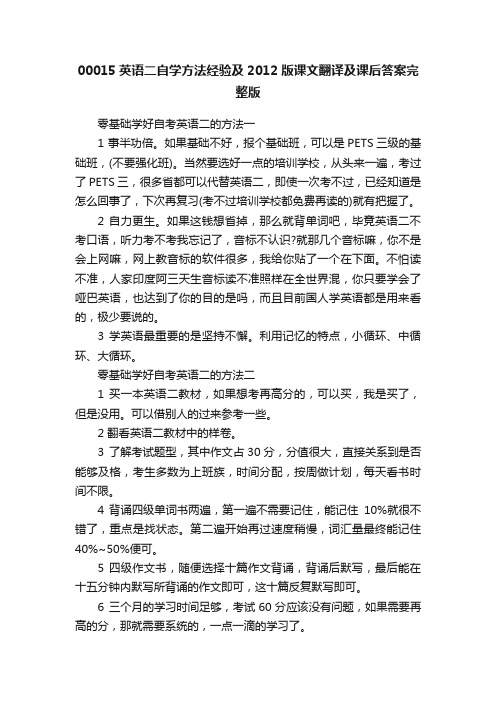
00015英语二自学方法经验及2012版课文翻译及课后答案完整版零基础学好自考英语二的方法一1 事半功倍。
如果基础不好,报个基础班,可以是PETS三级的基础班,(不要强化班)。
当然要选好一点的培训学校,从头来一遍,考过了PETS三,很多省都可以代替英语二,即使一次考不过,已经知道是怎么回事了,下次再复习(考不过培训学校都免费再读的)就有把握了。
2 自力更生。
如果这钱想省掉,那么就背单词吧,毕竟英语二不考口语,听力考不考我忘记了,音标不认识?就那几个音标嘛,你不是会上网嘛,网上教音标的软件很多,我给你贴了一个在下面。
不怕读不准,人家印度阿三天生音标读不准照样在全世界混,你只要学会了哑巴英语,也达到了你的目的是吗,而且目前国人学英语都是用来看的,极少要说的。
3 学英语最重要的是坚持不懈。
利用记忆的特点,小循环、中循环、大循环。
零基础学好自考英语二的方法二1 买一本英语二教材,如果想考再高分的,可以买,我是买了,但是没用。
可以借别人的过来参考一些。
2 翻看英语二教材中的样卷。
3 了解考试题型,其中作文占30分,分值很大,直接关系到是否能够及格,考生多数为上班族,时间分配,按周做计划,每天看书时间不限。
4 背诵四级单词书两遍,第一遍不需要记住,能记住10%就很不错了,重点是找状态。
第二遍开始再过速度稍慢,词汇量最终能记住40%~50%便可。
5 四级作文书,随便选择十篇作文背诵,背诵后默写,最后能在十五分钟内默写所背诵的作文即可,这十篇反复默写即可。
6 三个月的学习时间足够,考试60分应该没有问题,如果需要再高的分,那就需要系统的,一点一滴的学习了。
零基础学好自考英语二的方法三1 时间允许,要先复习英语(一),复习的策略是把考试大纲规定的单词背好,涉及到英语(一)的基础语法弄懂,课文就可以不看了。
单词背诵要贯穿始终,每天都要坚持背点,多重复,多回头看,多比较,可以采用联想、口诀、拆分等方法来记忆单词,日积月累才会收到良好效果。
自学考试英语二第三课2012版
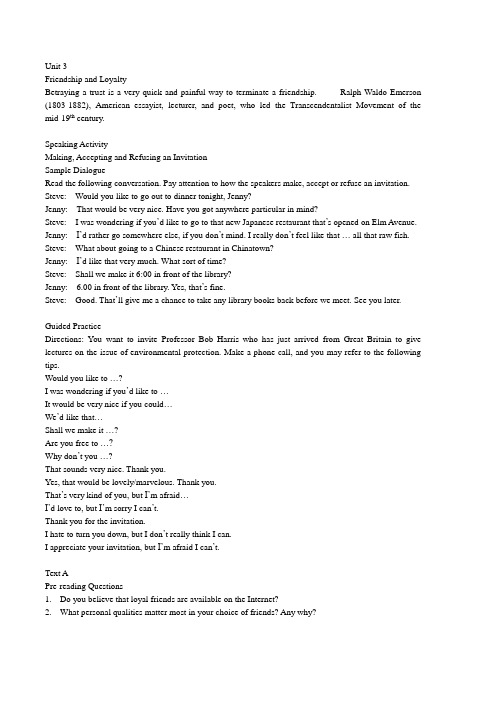
Unit 3Friendship and LoyaltyBetraying a trust is a very quick and painful way to terminate a friendship.--------Ralph Waldo Emerson (1803-1882), American essayist, lecturer, and poet, who led the Transcendentalist Movement of the mid-19th century.Speaking ActivityMaking, Accepting and Refusing an InvitationSample DialogueRead the following conversation. Pay attention to how the speakers make, accept or refuse an invitation. Steve: Would you like to go out to dinner tonight, Jenny?Jenny: That would be very nice. Have you got anywhere particular in mind?Steve: I was wondering if you’d like to go to that new Japanese restaurant that’s opened on Elm Avenue. Jenny: I’d rather go somewhere else, if you don’t mind. I really don’t feel like that … all that raw fish. Steve: What about going to a Chinese restaurant in Chinatown?Jenny: I’d like that very much. What sort of time?Steve: Shall we make it 6:00 in front of the library?Jenny: 6.00 in front of the library. Yes, that’s fine.Steve: Good. That’ll give me a chance to take any library books back before we meet. See you later.Guided PracticeDirections: You want to invite Professor Bob Harris who has just arrived from Great Britain to give lectures on the issue of environmental protection. Make a phone call, and you may refer to the following tips.Would you like to …?I was wondering if you’d like to …It would be very nice if you could…We’d like that…Shall we make it …?Are you free to …?Why don’t you …?That sounds very nice. Thank you.Yes, that would be lovely/marvelous. Thank you.That’s very kind of you, but I’m afraid…I’d love to, but I’m sorry I can’t.Thank you for the invitation.I hate to turn you down, but I don’t really think I can.I appreciate your invitation, but I’m afraid I can’t.Text APre-reading Questions1.Do you believe that loyal friends are available on the Internet?2.What personal qualities matter most in your choice of friends? Any why?Reflection: Friendship and LoyaltyHow many of us recognize true loyalty in a friend? Loyalty consists of a friend, who will stick by you, through thick and thin. A friend who is always honest with you and never betrays the friendship with lies is a loyal friend. If you have a loyal friend, you have indeed found a true virtue in that friend.The current trend on the Internet is befriending anyone who requests to be your friend. However, this new trend may lead to disaster. It may be popular and trendy to have a network filled with a multitude of mutual friends. However, one true loyal friend may be the only friend you need.A term used on the popular Facebook site is B.F.F. This acronym means best friends forever. Are they really your best friends forever? You might ask yourself this question, “Will they share my private matters with others on the pages of Facebook, or perish the thought, engage in gossip about me with others?” If the answer to that is, “I don’t know”, more than likely, they will not be your best friends forever. Maybe not, even for a day.I choose to have a B.L.F., a best loyal friend, for those of you who may be challenged by the use of acronyms during this age of technology and fast-talking.Loyalty found in a friend is akin to making a deposit in a bank account. More often than not, your deposits gain interest, an interest in your well-being and welfare. A loyal friend attracts another loyal friend. In essence, water does seek its own level.If you were a B.L.F. way before Facebook gained notoriety, then I’m sure you understand the premise of loyalty in a friend. You should never exploit your B.L.F. to gain more friends or make yourself seem more important to others. These are not the traits of a best loyal friend.A best loyal friend does not care who is invited to your party. They will attend your party and celebrate you, just in the way a best loyal friend should do.Reconnecting with a best loyal friend is easier to do on the pages of Facebook. However, a virtual friend does not assure you of his loyalty. My caution to you is that you’d better pay attention to the smiling faces on the Facebook pages. In the eighties we were warned of smiling faces in a song, which contained these lyrics, “A smile is just a frown turned upside down, my friend.” Now, that is the undisputed truth for my generation.Text BPre-reading Questions1.why do many people choose to keep dogs as pets instead of other animals?2.Why do you think a growing number of Chinese, especially the elderly, prefer to keep pets?A tribute to the DogThe best friend a man has in this world may turn against him and become his enemy. His son or daughter whom he has reared with loving care may prove ungrateful. Those who are nearest and dearest to us, those whom we trust with our happiness and our good name, may become traitors to their faith.The money that a man has he may lose. It flies away from him, perhaps when he needs it most. A man’s reputation may be sacrificed in a moment of ill-considered action. The people who are prone to fall on their knees to do us honor when success is with us may be the first to throw the stone of malice when failure settles its cloud upon our heads. The one absolute, unselfish friend a man may have in this selfish world, the one that never deserts him, the one that never proves ungrateful or treacherous, is his dog.A man’s dog stands by him in prosperity and in poverty, in health and in sickness. He will sleep on the cold ground when the wintry winds blow and the snow drives fiercely, if only he can be near his master’s side. He will kiss the hand that has no food to offer. He will lick the sores and wounds that come in the encounter with the roughness of the world. He guards the sleep of his pauper master as if he were a prince.When all other friends desert, he remains. When riches take wings and reputation falls to pieces, he is as constant in his love as the sun in its journey through the heavens. If fortune drives the master forth, an outcast in the world, friendless and homeless, the faithful dog asks no higher privilege than that of accompanying him to guard him against danger, to fight against his enemies. And when the last scene of all comes and death takes its master in its embrace and the body is laid away in the cold ground, no matter if all other friends pursue their way, there, by his graveside will the noble dog be found, his head between his paws, his eyes sad but open in alert watchfulness faithful and true even to death.。
Unit2自考英语22012版解析

②表示反复的动作 He had been mentioning your name to me. 他过去多次向我提到过你的名字。 You had been giving me everything. 你对我真是有求必应。 ③过去完成进行时还常用于间接引语中 The doctor asked what he had been eating. 医生问他吃了什么。 I asked where they had been staying all those days. 我问他们那些天是呆在哪儿的。 区别过去完成时与过去完成进行时 过去完成时表示 (1)在过去某一时间或动作之前已完成 的动作 或状态,时间发生在“过去的过 去”;这时往往和由when或before引导的从句或by短语; The sports meeting had begun when we got to school. 我们到学校时,运动会已经开始了。
They received the parcel that they ____ for a long time. [A] expected [B] have expected [C] had been expecting [D] had expected
1.他们只等了不多一会儿,公共汽车就来了。 They'd only been waiting for the bus a few moments when it came. 2.电话铃响了三分钟才有人接。 The telБайду номын сангаасphone had been ringing for three minutes before it was answered
自考《英语二》2012年出版最新讲义第五章
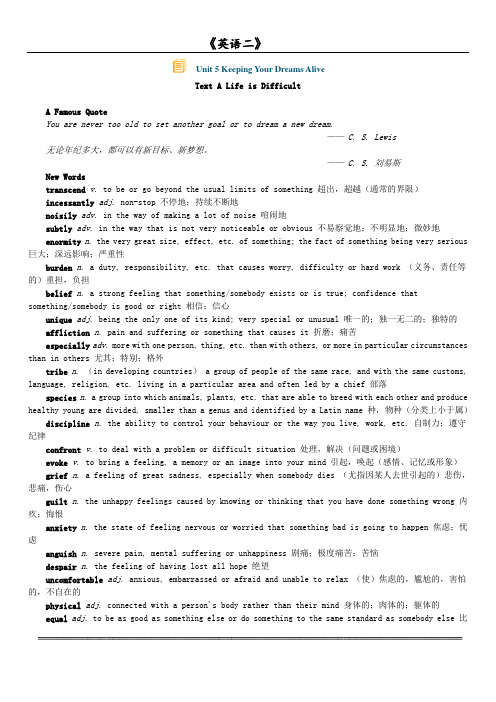
Unit 5 Keeping Your Dreams AliveText A Life is DifficultA Famous QuoteYou are never too old to set another goal or to dream a new dream.—— C. S. Lewis 无论年纪多大,都可以有新目标、新梦想。
—— C. S. 刘易斯New Wordstranscend v. to be or go beyond the usual limits of something 超出,超越(通常的界限)incessantly adj. non-stop 不停地;持续不断地noisily adv. in the way of making a lot of noise 喧闹地subtly adv. in the way that is not very noticeable or obvious 不易察觉地;不明显地;微妙地enormity n. the very great size, effect, etc. of something; the fact of something being very serious 巨大;深远影响;严重性burden n. a duty, responsibility, etc. that causes worry, difficulty or hard work (义务、责任等的)重担,负担belief n. a strong feeling that something/somebody exists or is true; confidence thatsomething/somebody is good or right 相信;信心unique adj. being the only one of its kind; very special or unusual 唯一的;独一无二的;独特的affliction n. pain and suffering or something that causes it 折磨;痛苦especially adv.more with one person, thing, etc. than with others, or more in particular circumstances than in others 尤其;特别;格外tribe n. (in developing countries) a group of people of the same race, and with the same customs, language, religion, etc. living in a particular area and often led by a chief 部落species n.a group into which animals, plants, etc. that are able to breed with each other and produce healthy young are divided, smaller than a genus and identified by a Latin name 种,物种(分类上小于属)discipline n. the ability to control your behaviour or the way you live, work, etc. 自制力;遵守纪律confront v. to deal with a problem or difficult situation 处理,解决(问题或困境)evoke v. to bring a feeling, a memory or an image into your mind 引起,唤起(感情、记忆或形象)grief n. a feeling of great sadness, especially when somebody dies (尤指因某人去世引起的)悲伤,悲痛,伤心guilt n. the unhappy feelings caused by knowing or thinking that you have done something wrong 内疚;悔恨anxiety n. the state of feeling nervous or worried that something bad is going to happen 焦虑;忧虑anguish n. severe pain, mental suffering or unhappiness 剧痛;极度痛苦;苦恼despair n. the feeling of having lost all hope 绝望uncomfortable adj. anxious, embarrassed or afraid and unable to relax (使)焦虑的,尴尬的,害怕的,不自在的physical adj. connected with a person's body rather than their mind 身体的;肉体的;躯体的equal adj. to be as good as something else or do something to the same standard as somebody else 比得上;敌得过conflict n. a situation in which people, groups or countries are involved in a serious disagreement or argument 冲突;争执;争论engender v. to make a feeling or situation exist 产生,引起(某种感觉或情况)pose v. to create a threat, problem, etc. that has to be dealt with 造成(威胁、问题等);引起;产生distinguish v. to recognize the difference between two people or things 区分;辨别;分清wisdom n. the ability to make sensible decisions and give good advice because of the experience and knowledge that you have 智慧;才智;精明mentally adv. connected with or happening in the mind 精神上;智力上;思想上spiritually adv. in the way that is connected with the human spirit, rather than the body or physical things 精神上;心灵上desire n. to want something; to wish for something 渴望;期望deliberately adv. done in a way that was planned, not by chance 故意;蓄意;存心instruct v. to teach somebody something, or show them how to do something 教授;指导dread v. to be very afraid of something; to fear that something bad is going to happen 非常害怕;极为担心Phrases and Expressionsmoan about to complain about something in a way that other people find annoying 抱怨a series of several events or things of a similar kind that happen one after the other 一系列;连续because of for the reason of 因为as well as in addition to somebody/something; too 除…之外cutting edge the newest, most advanced stage in the development of something (处于某事物发展的)尖端,最前沿,领先阶段call forth to produce a particular reaction 引起;使产生重点词汇transcend v. to be or go beyond the usual limits of something 超出,超越(通常的界限)eg: Such matters transcend man's knowledge, i.e. we cannot know about them. 这些问题人类是无法了解的。
2012自考英语二Unit4
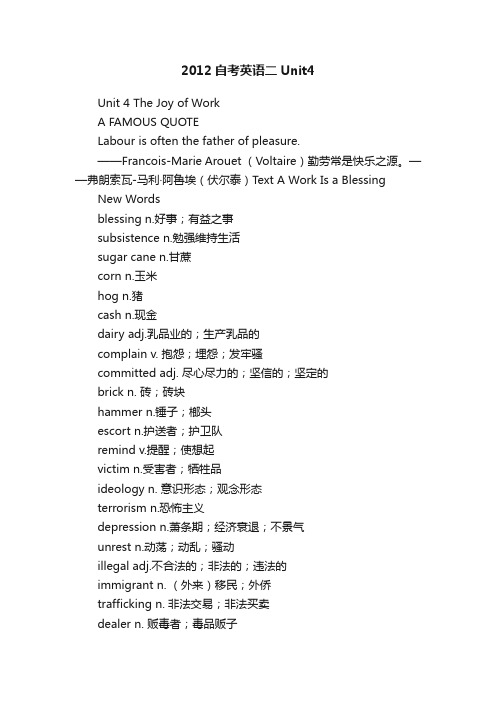
2012自考英语二Unit4Unit 4 The Joy of WorkA FAMOUS QUOTELabour is often the father of pleasure.——Francois-Marie Arouet (Voltaire)勤劳常是快乐之源。
——弗朗索瓦-马利·阿鲁埃(伏尔泰)T ext A Work Is a Blessing New Wordsblessing n.好事;有益之事subsistence n.勉强维持生活sugar cane n.甘蔗corn n.玉米hog n.猪cash n.现金dairy adj.乳品业的;生产乳品的complain v. 抱怨;埋怨;发牢骚committed adj. 尽心尽力的;坚信的;坚定的brick n. 砖;砖块hammer n.锤子;榔头escort n.护送者;护卫队remind v.提醒;使想起victim n.受害者;牺牲品ideology n. 意识形态;观念形态terrorism n.恐怖主义depression n.萧条期;经济衰退;不景气unrest n.动荡;动乱;骚动illegal adj.不合法的;非法的;违法的immigrant n. (外来)移民;外侨trafficking n. 非法交易;非法买卖dealer n. 贩毒者;毒品贩子gang n.一帮,一群,一伙(闹事、斗殴的年轻人)contribute v.增加;增进;添加(到某物)quit v.停止;戒掉Phrases and Expressionsbring in 赚得;挣eke out a living 竭力维持生计;勉强度日sink in 被完全理解;被充分意识到look forward to (高兴地)盼望,期待over and over again 多次;反复地;一再be prepared for 准备好;有所准备believe in 认为某事好(对、可接受):信任Work Is a BlessingI grew up in Lakeland, LA, one of 12 children. We all lived on my parents' subsistence farm(自耕自给农场). We grew cotton, sugar cane, corn, hogs, and chickens and had a large garden, but it didn't bring in much cash. So when I was 12, I got a part-time job on a dairy farm down the road, helping to milk cows. We milked 65 cows at 5 in the morning and again at 2 in the afternoon, seven days a week.工作是一种福气我在路易斯安那州的莱克兰长大,是家里12个孩子之一。
自考综合英语二_上册_下册_课文翻译
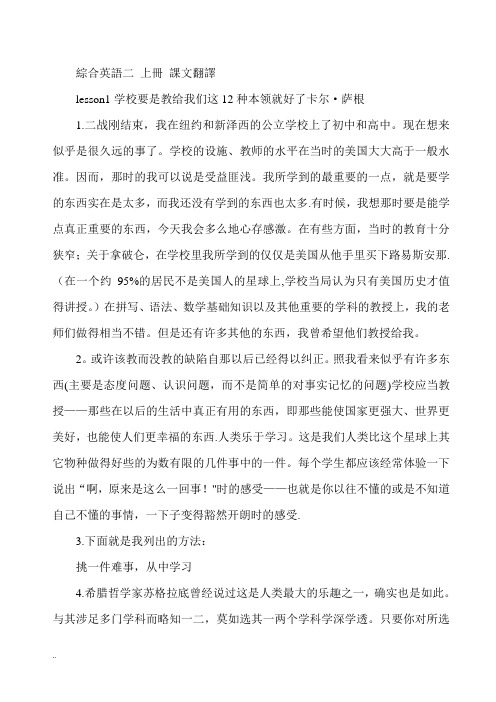
綜合英語二上冊課文翻譯lesson1学校要是教给我们这12种本领就好了卡尔·萨根1.二战刚结束,我在纽约和新泽西的公立学校上了初中和高中。
现在想来似乎是很久远的事了。
学校的设施、教师的水平在当时的美国大大高于一般水准。
因而,那时的我可以说是受益匪浅。
我所学到的最重要的一点,就是要学的东西实在是太多,而我还没有学到的东西也太多.有时候,我想那时要是能学点真正重要的东西,今天我会多么地心存感激。
在有些方面,当时的教育十分狭窄;关于拿破仑,在学校里我所学到的仅仅是美国从他手里买下路易斯安那.(在一个约95%的居民不是美国人的星球上,学校当局认为只有美国历史才值得讲授。
)在拼写、语法、数学基础知识以及其他重要的学科的教授上,我的老师们做得相当不错。
但是还有许多其他的东西,我曾希望他们教授给我。
2。
或许该教而没教的缺陷自那以后已经得以纠正。
照我看来似乎有许多东西(主要是态度问题、认识问题,而不是简单的对事实记忆的问题)学校应当教授——那些在以后的生活中真正有用的东西,即那些能使国家更强大、世界更美好,也能使人们更幸福的东西.人类乐于学习。
这是我们人类比这个星球上其它物种做得好些的为数有限的几件事中的一件。
每个学生都应该经常体验一下说出“啊,原来是这么一回事!"时的感受——也就是你以往不懂的或是不知道自己不懂的事情,一下子变得豁然开朗时的感受.3.下面就是我列出的方法:挑一件难事,从中学习4.希腊哲学家苏格拉底曾经说过这是人类最大的乐趣之一,确实也是如此。
与其涉足多门学科而略知一二,莫如选其一两个学科学深学透。
只要你对所选的课题感兴趣,只要你的研究不脱离课题本身更为广阔的人文环境,你的课题是什么并不重要。
教会你自己一个课题以后,你就会对教授你自己另一课题的能力更加充满信心。
你会逐渐发现你已获得了一种主要技能.世界的变化日新月异,你必须在一生中不断地教授你自己。
但不要沉溺于你感兴趣的或你擅长的第一门学科而止步不前。
2012年-英语二
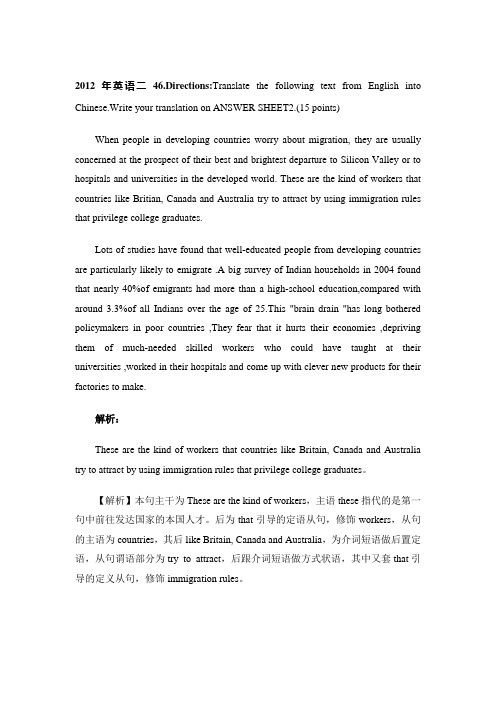
2012年英语二46.Directions:Translate the following text from English into Chinese.Write your translation on ANSWER SHEET2.(15 points)When people in developing countries worry about migration,they are usually concerned at the prospect of their best and brightest departure to Silicon Valley or to hospitals and universities in the developed world. These are the kind of workers that countries like Britian,Canada and Australia try to attract by using immigration rules that privilege college graduates.Lots of studies have found that well-educated people from developing countries are particularly likely to emigrate .A big survey of Indian households in 2004 found that nearly 40%of emigrants had more than a high-school education,compared with around 3.3%of all Indians over the age of 25.This "brain drain "has long bothered policymakers in poor countries ,They fear that it hurts their economies ,depriving them of much-needed skilled workers who could have taught at their universities ,worked in their hospitals and come up with clever new products for their factories to make.解析:These are the kind of workers that countries like Britain, Canada and Australia try to attract by using immigration rules that privilege college graduates。
【VIP专享】2012自考英语二 Unit 2

Unit 2 Mistake to Success A Famous Quote Success is going from failure to failure without losing your enthusiasm. ——Winston Churchill 成功就是经历一次一次失败后,热情依旧。
——温斯顿·丘吉尔TEXT A Spilt MilkNew Words spill (spilt)v.(使)洒出,泼出,溢出 respond v.作出反应,响应 interview v.(媒体)采访;访问; 面试 creative adj. 创造(性)的;创作的 occur v. 发生;出现 remove v.移开;拿开;去掉 refrigerator n.冰箱 grip n.紧握;紧抓 slippery adj.滑的;滑的抓不住(或站不稳,难以行走)的 content n.所容纳之物;所含之物 veritable adj.十足的;名副其实的;不折不扣的 yell v.喊;大喊;吼叫 lecture n.(冗长的)教训,训斥,谴责 mess n.肮脏;杂乱;不整洁 rarely adv. 罕有;很少;不常 puddle n.水洼;小水坑 eventually adv.最后;终于 restore v.使复原;使复位,使复职 sponge n.海绵块 effectively adv.有效的 tiny adj. 极小的;微小的 discover v.查明;发现 grasp v.抓紧;抓牢 lip n.边,边沿 renowned adj. 有名的;闻名的;受尊敬的 remark v.谈论;评论 opportunity n.机会;时机 scientific adj.科学(上)的;关于科学的 valuable adj. 很有用的;很重要的;宝贵的Phrases and Expressions in this manner 用这种方式 set …apart from 区别;使与众不同重点词汇讲解 spill v.(使)洒出,泼出,溢出 eg: The ink spilt all over the desk. 墨水洒了一桌子。
2012自考英语二Unit1全

Unit 1 The Power of Langua ge学习方法指南五个方面把握文章1)词2)句3)篇4)义5)背诵或复述重点段落(当天重复,第二天再重复,七天后再重复)课后习题1)结合课文里出现的要点,完成题目2)标记不熟练的题目,当天重复一遍,第二天再重复一遍,考前再重复一遍Unit 1 The Power of Langua geA FAMOUS QUOTELangua ge is the dressof though t.--Samuel Johnso n语言是思维的外衣。
--塞缪尔·约翰逊Text A Critic al Readin gPre-readin g questions1.Do you usually challe nge the idea an author repres ents? What do you thinkis active reading?2. What sugges tions do you expect the author will give on readin g critic ally?Vocabulary词汇四点要求 1.音 2.义 3.衍生变化 4.用法/搭配New Wordscritic al adj. 有判断力的;判断公正(或审慎的);批判的non-fictio n n.纪实文学position n. 观点;态度;立场statem ent n.说明;说法;表态question v. 表示疑问;怀疑evalua te vt. 估计;评价,评估contex t n. (事情发生的)背景,环境,来龙去脉value n. 是非标准;价值观repres ent v. 描述;表现assert ion n. 明确肯定;断言suffic ienta dj. 足够的;充足的statis tic n. 统计数字;统计资料integr ate v.(使)合并,成为一体authority n. 专家;学术权威;泰斗compar e v. 比较;对比subjec t n. 主题;题目;题材consis tent adj. 相符的;符合的(consis tency)inconsisten cy n. 不一致assump tion n. 假定;假设case n. 具体情况;事例direct ly adv. 直接地;径直地identify v. 找到;发现valida dj. 符合逻辑的;合理的;确凿的credib le adj. 可信的;可靠的landma rk n.(标志重要阶段的)里程碑;地标releva nt adj. 紧密相关的;切题的curren t adj. 现时发生的;当前的approp riate adj. 合适的;恰当的bias n. 偏见;偏心;偏向consid e rably adv. 非常;很;相当多地Democr at n.(美国)民主党党员,民主党支持者Republican n.(美国)共和党党员,共和党支持者reflec t v. 显示;表明;表达inform ed adj. 有学问的;有见识的Phrase s and Expressionsapplyto 使用;适用于put forth提出;产生take sth into accoun t 考虑;顾及accept/take sth at face value相信表面;信以为真with a grainof salt 有保留地;持怀疑态度地重点词汇critic al adj. 有判断力的;判断公正(或审慎的)eg: Try to develo p a more critic al attitu de, instea d of accept ing everyt hingat face value.要学会对一切事物一丝不苟, 而不要注重表面现象.其他用法:危机中的;危急时刻的;决定性的;关键的eg: We are at a critic al time in our histor y.我们正处于历史的紧要关头。
2012自考英语二Unit_7_Inner_Voice
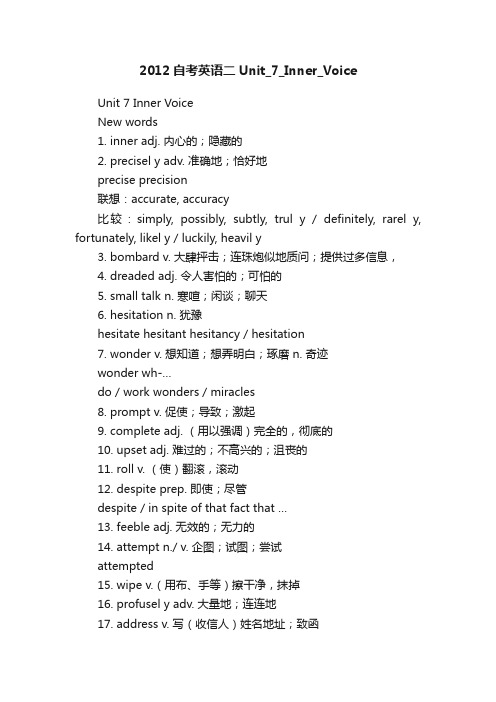
2012自考英语二Unit_7_Inner_VoiceUnit 7 Inner VoiceNew words1. inner adj. 内心的;隐藏的2. precisel y adv. 准确地;恰好地precise precision联想:accurate, accuracy比较:simply, possibly, subtly, trul y / definitely, rarel y, fortunately, likel y / luckily, heavil y3. bombard v. 大肆抨击;连珠炮似地质问;提供过多信息,4. dreaded adj. 令人害怕的;可怕的5. small talk n. 寒喧;闲谈;聊天6. hesitation n. 犹豫hesitate hesitant hesitancy / hesitation7. wonder v. 想知道;想弄明白;琢磨 n. 奇迹wonder wh-…do / work wonders / miracles8. prompt v. 促使;导致;激起9. complete adj. (用以强调)完全的,彻底的10. upset adj. 难过的;不高兴的;沮丧的11. roll v. (使)翻滚,滚动12. despite prep. 即使;尽管despite / in spite of that fact that …13. feeble adj. 无效的;无力的14. attempt n./ v. 企图;试图;尝试attempted15. wipe v.(用布、手等)擦干净,抹掉16. profusel y adv. 大量地;连连地17. address v. 写(收信人)姓名地址;致函18. receptionist n. 接待员19. attach v. 把…固定,把…附(在…上)attach … to…attached 依恋的;附加的;附属的 attachment 依恋;附件20. emotion n. 强烈的感情;情感;情绪emotional emotionless21. contain v. 控制,克制,抑制(感情)22. apparentl y adv. 据…所知;看来;显然23. overwhelming adj. 巨大的;压倒性的;无法抗拒的overwhelming problemsan overwhelmed person联想:surprised / surprisingexcited / excitingamazed / amazingdisappointed / disappointingfrightened / fright ening注意:excited eyes / expressions / looks24. scream v. 高声喊,大声叫Phrases and Expressions1. be lost in one's thought 陷入沉思2. break down 失败3. come up with 找到(答案等);想出4. drop…off (顺路)把…放下5. take one's own life 自杀6. in desperation 在绝望中;走投无路7. care about sb. 关心;关怀8. take a chance 冒险9. make a difference 有作用;产生影响Your Inner VoiceMy day started just like all the other days for the past 15years where I get up, make some coffee, shower, get dressed and leave for the train station at precisel y7:35 A.M. to arrive at work by 8:30. While on the train I would always choose a seat away from the crowd so I can read the n ewspaper in peace and quiet. At work I am always being bombarded with questions(质问)from coworkers, suppliers, telephone and then those dreaded meetings, so the last thing I need is some stranger to sit beside me and make small talk.你内心的声音我的一天又开始了,就像过去15年中的每一天一样,起床,煮咖啡,沐浴,穿衣服,在7点35分准时赶到火车站搭乘火车以便在8点30分之前到达工作地点。
自考英语二课文翻译
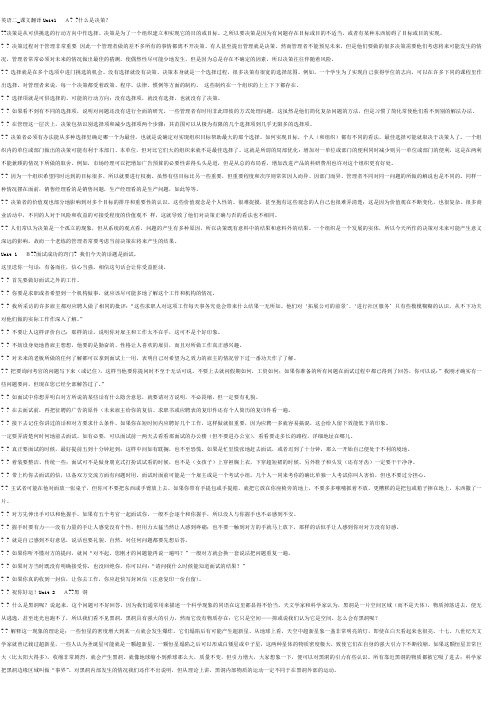
英语二_课文翻译Unit1 A? ?什么是决策???决策是从可供挑选的行动方向中作选择。
决策是为了一个组织建立和实现它的目的或目标。
之所以要决策是因为有问题存在目标或目的不适当,或者有某种东西妨碍了目标或目的实现。
? ? 决策过程对于管理非常重要因此一个管理者做的差不多所有的事情都离不开决策、有人甚至提出管理就是决策。
然而管理者不能预见未来,但是他们要做的很多决策需要他们考虑将来可能发生的情况,管理者常常必须对未来的情况做出最佳的猜测,使偶然性尽可能少地发生,但是因为总是存在不确定的因素,所以决策往往伴随着风险。
? ? 选择就是在多个选项中进门挑选的机会。
没有选择就没有决策、决策本身就是一个选择过程,很多决策有很宽的选择范围。
例如,一个学生为了实现自己获得学位的志向,可以在许多下同的课程里作出选择。
对管理者来说,每一个决策都受着政策、程序。
法律、惯例等方面的制约。
这些制约在一个组织的上上下下都存在。
? ? 选择项就是可供选择的、可能的行动方向;没有选择项,就没有选择,也就没有了决策。
? ? 如果看不到有不同的选择项,说明对问题还没有进行全面的研究。
一些管理者有时用非此即彼的方式处理问题,这虽然是他们简化复杂问题的方法,但是习惯了简化常使他们看不到别的解法办法。
? ? 在管理这一层次上,决策包括识别选择项和减少选择项两个步骤;其范围可以从极为有限的几个选择项到几乎无限多的选择项。
? ? 决策者必须有办法能从多种选择里确定哪一个为最佳,也就是说确定对实现组织目标帮助最大的那个选择。
如何实现目标,个人(和组织)都有不同的看法。
最佳选择可能就取决于决策人了。
一个组织内的单位或部门做出的决策可能有利于本部门、本单位,但对比它们大的组织来就不是最佳选择了。
这就是所谓的局部优化:增加对一单位或部门的便利同时减少则另一单位或部门的便利,这是在两利不能兼顾的情况下所做的取舍。
例如,市场经理可以把增加广告预算的必要性讲得头头是道,但是从总的布局看,增加改进产品的科研费用也许对这个组织更有好处。
2012自考英语二 Unit_12_A_Break_from_Life
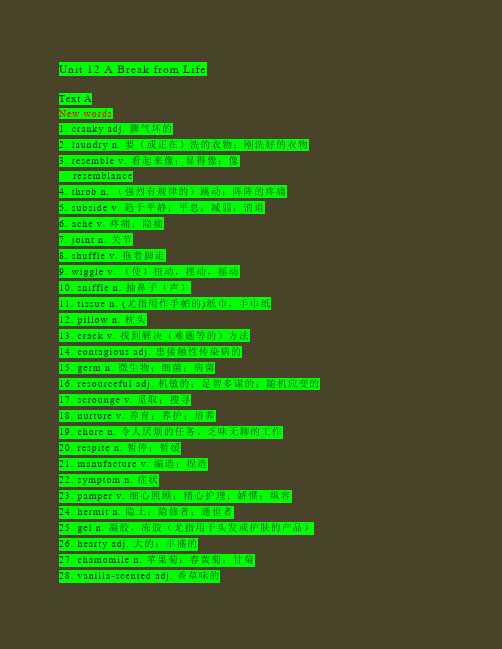
Unit 12 A Break from LifeText ANew words1. cranky adj. 脾气坏的2. laundry n. 要(或正在)洗的衣物;刚洗好的衣物3. resemble v. 看起来像;显得像;像resemblance4. throb n. (强烈有规律的)跳动;阵阵的疼痛5. subside v. 趋于平静;平息;减弱;消退6. ache v. 疼痛;隐痛7. joint n. 关节8. shuffle v. 拖着脚走9. wiggle v. (使)扭动,摆动,摇动10. sniffle n. 抽鼻子(声)11. tissue n. (尤指用作手帕的)纸巾,手巾纸12. pillow n. 枕头13. crack v. 找到解决(难题等的)方法14. contagious adj. 患接触性传染病的15. germ n. 微生物;细菌;病菌16. resourceful adj. 机敏的;足智多谋的;随机应变的17. scrounge v. 觅取;搜寻18. nurture v. 养育;养护;培养19. chore n. 令人厌烦的任务、乏味无聊的工作20. respite n. 暂停;暂缓21. manufacture v. 编造;捏造22. symptom n. 症状23. pamper v. 细心照顾;精心护理;娇惯;纵容24. hermit n. 隐土;隐修者;遁世者25. gel n. 凝胶,冻胶(尤指用于头发或护肤的产品)26. heart y adj. 大的;丰盛的27. chamomile n. 苹果菊;春黄菊;甘菊28. vanilla-scented adj. 香草味的29. gingerly adv. 谨慎地;小心翼翼地;轻手轻脚地30. grateful adj. 感激的;表示感谢的be grateful to sb. for sth. ungrateful比较:graceful disgraceful31. spa n. 水疗32. tub n. 浴缸;浴盆33. drain n. 下水道;排水管34. refresh v. 使恢复精力;使凉爽35. emotionally adv. 感情上地;情感上地emotion emotional36. empower v. 增加(某人的)自主权;使控制局势37. permission n. 准许;许可;批准permit38. justify v. 对…作出解释;为…辩解(或辩护)39. awareness n. 知道;认识;意识Phrases and Expressions1. pile up 堆积;积压2. come down with 患,得,染上(小病)3. slip away 消失;消亡;死去4. respond to 作出反馈;响应5. care for 照顾,照料(病、老、幼者等)6. tend to 照料;照管;护理Feeling FreeI woke up feeling cranky(脾气坏的). I didn't want to do housework, though the laundry was piling up. I didn't want to read the work I brought home from the office. I didn't want to do anything that resemble d responsible behavior. It was that kind of day.(承上总结句)感受自由一醒来我的心情就很糟糕。
2012版自考英语二课文中英文对照
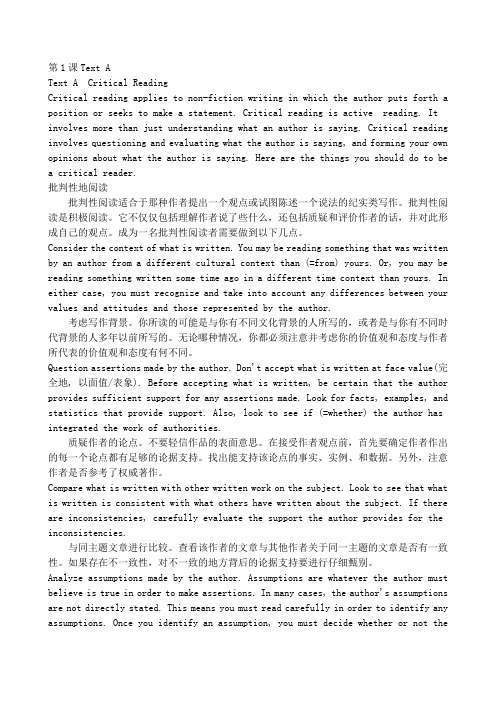
第1课Text AText A Critical ReadingCritical reading applies to non-fiction writing in which the author puts forth a position or seeks to make a statement. Critical reading is active reading. It involves more than just understanding what an author is saying. Critical reading involves questioning and evaluating what the author is saying, and forming your own opinions about what the author is saying. Here are the things you should do to be a critical reader.批判性地阅读批判性阅读适合于那种作者提出一个观点或试图陈述一个说法的纪实类写作。
批判性阅读是积极阅读。
它不仅仅包括理解作者说了些什么,还包括质疑和评价作者的话,并对此形成自己的观点。
成为一名批判性阅读者需要做到以下几点。
Consider the context of what is written. You may be reading something that was written by an author from a different cultural context than (=from) yours. Or, you may be reading something written some time ago in a different time context than yours. In either case, you must recognize and take into account any differences between your values and attitudes and those represented by the author.考虑写作背景。
自考 英语(二)课文翻译及练习答案

第一部分 Text A & 第二部分 Text B第一部分 Text A【课文译文】怎样成为一名成功的语言学习者决策是从可供挑选的行动方案中作出选择,目的在于确定并实现组织机构的目标或目的。
之所以要决策是因为存在问题,或是目标或目的不对,或某种东西妨碍目标或目的实现。
因此,决策过程对于管理人员非常重要。
管理者所做的一切几乎都与决策有关,事实上,有人甚至认为管理过程就是决策过程。
虽然决策者不能预测未来,但他们的许多决策要求他们必须考虑未来可能会发生的情况。
管理者必须对未来的事情作出最佳的猜测,并使偶然性尽可能少地发生。
但因为总是存在着未知情况,所以决策往往伴随着风险。
有时失误的决策带来的后果不很严重,但有时就会不堪设想。
选择就是从多种选项中进行取舍,没有选择,就没有决策。
决策本身就是一个选择的过程,许多决策有着很广的选择范围。
例如,学生为了实现自己获得学位的目标,可能会从多门课程中进行选择,对于管理者来说,每一个决策都受到政策、程序、法律、惯例等方面的制约,这些制约存在于一个组织的各个部门里。
选项就是可供选择的种种可行的行动方案。
没有选项,就没有选择,因而也就没有决策。
如果看不到任何选项,这意味着还没有对问题进行彻底的研究。
例如,管理者有时会用“非此即彼”的方式处理问题,这是他们简化问题的方法。
这种简化问题的习惯常常使他们看不到其他的选项。
在管理这个层次上,制定决策包括:识别选项和缩小选项范围,其范围小到微乎其微,大到近乎无限。
决策者必须有某种方法来断定几种选项中的最佳选项,即哪个选项最有利于实现其组织的目标。
组织的目标是指该组织努力完成或达到的目标或现状。
由于个人(或组织)对于怎样实现其目标的方式都有不同的见解,最佳的选择就在于决策者了。
常常是一个组织的下属部门做出的决策对自己有利,而对上一级的部门来说,就不是较佳选择了。
这种增加部门的局部利益而减少其他部门的局部利益所作出的权衡,叫做局部优化。
- 1、下载文档前请自行甄别文档内容的完整性,平台不提供额外的编辑、内容补充、找答案等附加服务。
- 2、"仅部分预览"的文档,不可在线预览部分如存在完整性等问题,可反馈申请退款(可完整预览的文档不适用该条件!)。
- 3、如文档侵犯您的权益,请联系客服反馈,我们会尽快为您处理(人工客服工作时间:9:00-18:30)。
第1课Text AText A Critical ReadingCritical reading applies to non-fiction writing in which the author puts forth a position or seeks to make a statement. Critical reading is active reading. It involves more than just understanding what an author is saying. Critical reading involves questioning and evaluating what the author is saying, and forming your own opinions about what the author is saying. Here are the things you should do to be a critical reader.批判性地阅读批判性阅读适合于那种作者提出一个观点或试图陈述一个说法的纪实类写作。
批判性阅读是积极阅读。
它不仅仅包括理解作者说了些什么,还包括质疑和评价作者的话,并对此形成自己的观点。
成为一名批判性阅读者需要做到以下几点。
Consider the context of what is written. You may be reading something that was written by an author from a different cultural context than (=from) yours. Or, you may be reading something written some time ago in a different time context than yours. In either case, you must recognize and take into account any differences between your values and attitudes and those represented by the author.考虑写作背景。
你所读的可能是与你有不同文化背景的人所写的,或者是与你有不同时代背景的人多年以前所写的。
无论哪种情况,你都必须注意并考虑你的价值观和态度与作者所代表的价值观和态度有何不同。
Question assertions made by the author. Don't accept what is written at face value(完全地, 以面值/表象). Before accepting what is written, be certain that the author provides sufficient support for any assertions made. Look for facts, examples, and statistics that provide support. Also, look to see if (=whether) the author has integrated the work of authorities.质疑作者的论点。
不要轻信作品的表面意思。
在接受作者观点前,首先要确定作者作出的每一个论点都有足够的论据支持。
找出能支持该论点的事实、实例、和数据。
另外,注意作者是否参考了权威著作。
Compare what is written with other written work on the subject. Look to see that what is written is consistent with what others have written about the subject. If there are inconsistencies, carefully evaluate the support the author provides for the inconsistencies.与同主题文章进行比较。
查看该作者的文章与其他作者关于同一主题的文章是否有一致性。
如果存在不一致性,对不一致的地方背后的论据支持要进行仔细甄别。
Analyze assumptions made by the author. Assumptions are whatever the author must believe is true in order to make assertions. In many cases, the author's assumptions are not directly stated. This means you must read carefully in order to identify any assumptions. Once you identify an assumption, you must decide whether or not theassumption is valid.分析作者提出的假设。
假设是作者认为具有正确性的前提,基于这些前提作者才能提出论点。
很多时候作者的假设并没有直接说明,这就意味着你必须通过仔细阅读来发现这些假设。
一旦发现某一假设,你必须判断这一假设是否合理。
Evaluate the sources the author uses. In doing this, be certain that the sources are credible. For example, Einstein is a credible source if the author is writing about landmark achievements in physics. Also be certain that the sources are relevant. Einstein is not a relevant source when the subject is poetry. Finally, if the author is writing about a subject in its current state, be sure that the sources are current. For example, studies done by Einstein in the early 20th century may not be appropriate if the writer is discussing the current state of knowledge in physics.鉴别文章出处。
鉴别时要确保文章出处真实可信。
例如,如果文章是关于物理学里程碑式的成就,那么爱因斯坦的论述就是可靠的出处。
此外还要确保出处具有相关性。
如果文章主题是诗歌,那么爱因斯坦的论述就不是相关出处。
最后,如果作者写的是某个主题当前的情形,那就要确保出处来源也是当前最新的。
例如,如果作者讨论的是物理学知识的现状,那么爱因斯坦在二十世纪早期进行的研究可能就不适合作出处了。
Identify any possible author bias. A written discussion of American politics will likely look considerably different depending on whether the writer is a Democrat or a Republican. What is written may very well reflect a biased position. You need to take this possible bias into account when reading what the author has written. That is, take what is written with "a grain of salt" (有保留地).甄别作者可能带有的偏见。
有关美国政治的书面论述可能因作者是共和党人或民主党人迥然而异。
作者所写的内容很可能反映其带有偏见的立场。
阅读时要考虑到这种偏见存在的可能性。
也就是说,要对文章内容“半信半疑”。
By being a critical reader, you will become better informed and may change your views as appropriate.成为一名批判性阅读者,你的思路会不断拓宽,观点会更加合理。
第1课Text BThe Language of ConfidenceThe language we use programs our brains. Mastering our language gives us a great degree of mastery over our lives and our destinies. It is important to use the language in the best way possible in order to dramatically improve our quality of life.自信的语言语言能影响我们的大脑。
掌握语言就能在很大程度上掌握我们的生活和命运。
将语言发挥到极致可以极大地改善我们的生活质量,这一点至关重要。
Even the smallest of words can have the deepest effect on our subconscious mind, which is like a child, and it doesn't really understand the difference between what really happens and what you imagine. It is eager to please and willing to carry out any commands that you give it -- whether you do this knowingly or not is entirely up to you.再短的单词也能对我们的潜意识产生深远的影响。
